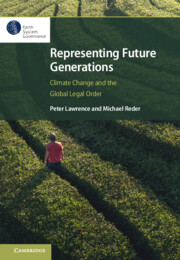Book contents
- Representing Future Generations
- Series page
- Representing Future Generations
- Copyright page
- Contents
- Preface
- 1 Introduction
- Part I Normative Framework
- Part II International Law and Institutions
- Part III Case Studies
- 6 The ICJ Advisory Opinion on Climate Change and Proxy Representation of Future Generations
- 7 A UN Committee on the Rights of the Child Case Study
- 8 A UN Special Envoy for Future Generations
- 9 Conclusion
- Index
- References
8 - A UN Special Envoy for Future Generations
from Part III - Case Studies
Published online by Cambridge University Press: 19 September 2025
- Representing Future Generations
- Series page
- Representing Future Generations
- Copyright page
- Contents
- Preface
- 1 Introduction
- Part I Normative Framework
- Part II International Law and Institutions
- Part III Case Studies
- 6 The ICJ Advisory Opinion on Climate Change and Proxy Representation of Future Generations
- 7 A UN Committee on the Rights of the Child Case Study
- 8 A UN Special Envoy for Future Generations
- 9 Conclusion
- Index
- References
Summary
Chapter 8 makes a preliminary assessment of the likely effectiveness of the proposed UN special envoy for future generations by examining this proposal through the lens of three frameworks. These frameworks are, firstly, the rationale or normative basis for such a proposal measured against the principles of intergenerational justice, solidarity and vulnerability set out in Chapter 3 of the book. Next, the special envoy proposal is evaluated in terms of its legitimacy and effectiveness using the criteria elaborated in Chapter 5 (inclusive representation, democratic control in the form of accountability and transparency, deliberation, source-based/input legitimacy in terms of expertise, legal legitimacy, tradition and discourse, substantial/output legitimacy in terms of effectiveness and equity). The possible functions of a special envoy are examined and recommendations are made as to what mandate the special envoy should have, applying the matrix of proxy functions elaborated earlier in this book, which involves breaking proxy representation down into its functions (representative, compliance, reform and norm entrepreneurial). Finally, an overarching framework is proposed for measuring the potential effectiveness of the special envoy which incorporates both frameworks – proxy representation functions and democratic legitimacy.
Keywords
Information
- Type
- Chapter
- Information
- Representing Future GenerationsClimate Change and the Global Legal Order, pp. 200 - 219Publisher: Cambridge University PressPrint publication year: 2025
References
Accessibility standard: WCAG 2.0 A
Why this information is here
This section outlines the accessibility features of this content - including support for screen readers, full keyboard navigation and high-contrast display options. This may not be relevant for you.Accessibility Information
Content Navigation
Allows you to navigate directly to chapters, sections, or non‐text items through a linked table of contents, reducing the need for extensive scrolling.
Provides an interactive index, letting you go straight to where a term or subject appears in the text without manual searching.
Reading Order & Textual Equivalents
You will encounter all content (including footnotes, captions, etc.) in a clear, sequential flow, making it easier to follow with assistive tools like screen readers.
Structural and Technical Features
You gain clarity from ARIA (Accessible Rich Internet Applications) roles and attributes, as they help assistive technologies interpret how each part of the content functions.
